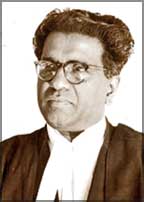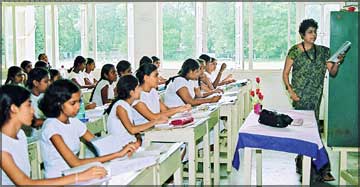Official Languages Commission - taking up a fresh challenge
Neil Dias
The protection and enforcement of language rights in our country has
been a burning issue since independence. Prior to independence all the
powers that came to colonize the country which included the Portuguese,
the Dutch and the English in turn imposed their respective languages on
all the communities in the country without any room for protest or
opposition. The position in regard to the use of language during the
Sinhalese kings should be made the subject of a detailed research by the
Official Languages Commission under Section 7 of the Act. Soon after
independence section 29 of the Soulbury Constitution sought to protect
minority rights and interests by providing a fortress of entrenched
rights in all spheres of activity including language.

Dr N M Perera |

Dr Colvin R de Silva |
The Official Language Act No. 33 of 1956 which made Sinhala the sole
official language changed all this. The provision came to be rightly
regarded as an attempt to impose an alien language on people. The Tamil
people felt that they were being discriminated against and treated
unfairly by the introduction of these measures. A deep sense of
oppression and alienation began to prevail and develop among them. Tamil
speaking people who were comfortable with the use of the English
language began to fear that they were losing their positions in
government service and lagging behind in the spheres of education and
higher education. Both Dr. N.M. Perera and Dr. Colvin R de Silva spoke
in Parliament and outside in opposition to these new measures and
expressed their anxiety that the measures will lead to ‘two torn and
bleeding states.’ They declared that the “only solution for the language
problem is one that will give proper official status to the Tamil
language. This alone will ensure the unity of the country.”
International law
The use of their languages by minority or less numbered communities
or any section of people is guaranteed by International Law. Article 27
of the International Covenant on Civil and Political Rights (ICCPR)
mandates states to afford protection for the language rights of less
numbered communities. An individual is empowered to complain to the
Human Rights Committee, the body established to monitor the
implementation by States party of the ICCPR and its Protocols against
any violations of these rights and freedoms. The constitutions of the
United States, Canada, Switzerland, India and South Africa have enlarged
and adopted these measures and have incorporated the protective
provisions into their constitutions.
|

Learning a language, an interesting experience. |
The South African Constitution of 1996 under Article 6 recognizes
eleven official languages including English. The other languages which
are so accommodated are Sepedi, Sesotho, Setswana, siSwati, Tshivenda,
Xitsonga, Afrikaans, isiNdebele, isiXhosa and isiZulu. The state is
constitutionally mandated to take practical and positive measures to
elevate the status and advance the use of these languages. The national
government and the provincial governments are by legislative and other
measures constitutionally mandated to regulate and monitor the use of
all official languages. All official languages must enjoy parity of
esteem and must be treated equitably. A Pan South African Language Board
established by national legislation must promote and create conditions
for the development and use of all official languages and also promote
and ensure respect for several other languages commonly used by
communities in South Africa and used for religious purposes.
Ten Year National Plan
Article 29 of the Indian Constitution decrees that any section of the
citizens resident in the territory of India or any part thereof having a
distinct language, script or culture of its own shall have the right to
conserve the same. No citizen shall be denied admission into any
educational institution maintained by the state receiving aid out of
state funds on grounds only of language, race, caste, religion or any of
them.
Having brought back peace and stability to the country our Head of
State has embarked on an ambitious Ten Year National Plan for a
Trilingual Sri Lanka which incidentally, according to Dr. Sunimal
Fernando, is “the first comprehensive document on the subject
originating from a head of state adopting as its priorities the creation
of an ethnically harmonious society by supporting the equal spread of
languages.” While frankly admitting that the state has failed to cater
effectively to the language and through it the cultural needs of the
people, the plan, the implementation of which is spread over a period of
ten years, is phased out into three stages.
The first four years is to be the piloting phase, the second spread
over five to eight years is planned to be the expansion phase and the
third and final phase will be devoted to the consolidation of the gains
and achievements made during the earlier two stages. No institution
dealing with the three languages or affected by them will be left out of
the programme and the leadership and direction will be provided by the
setting up of two major supra agencies namely the Language Agency of Sri
Lanka (LASL) and the National Agency for Language Research and Training
(NALRT) directly under the President.
Official Languages Commission
Under this plan the Official Languages Commission is expected to be
awakened and revitalized into exercising its lawful powers and functions
in keeping with the spirit of Chapter 1V of the Constitution which
confers official and national status to both languages while making
English a link language. The commission which has been created under an
Act of Parliament (Act No.18 of 1991) enacted in pursuance of Article 18
(4) of the constitution is mandated to, under the historical
circumstances detailed above, recommend to the President principles of
policy relating to the use or nonuse of the Official Languages and to
rigorously monitor and supervise compliance with the provisions
contained in Chapter 1V of the Constitution.
It is constitutionally and legally mandated to also promote the
appreciation and esteem of the official languages and the acceptance,
maintenance and continuance of their status, equality and right of use.
The Commission is empowered to conduct investigations on its own
initiatives and in response to complaints made to it and to take
remedial action as provided for by the provisions of the Act creating
it. Additionally the Commission is empowered to initiate reviews of any
laws and regulations, directives or administrative practices which
affect the status or use of any of the three languages. This will
require the Commission to supervise and monitor the activities of all
government departments, Central and Provincial, law enforcement agencies
and other institutions including all educational and higher learning
institutions in their day to day work in regard to the fostering and
implementation of the three languages. The Commission is empowered to
issue and commission such studies and policy papers on the present and
past status or use of the relevant languages as it may deem necessary
and desirable. It is also empowered to undertake educational activities
including sponsoring or initiating publications or other media
presentations on the status or use of the three languages as it may
consider desirable. The Commission can also appoint such committees as
may be necessary to assist the Commission in the performance of its
duties consisting of such number of members that may be determined by
the Commission.
Legal status
The Commission is mandated to investigate every complaint made to it
arising from any act done or omitted in the administration of the
affairs of any public institution relating to the status and use of any
of the three languages and particularly whenever such complaint
discloses that the constitutional or legal status of an official
language is or was not being recognized or the right to the use of the
three languages in the manner set out in Articles 20 to 24 of the
Constitution is or was not being recognized or complied with.
The Commission will also investigate any complaint regarding any
provision of any Act of Parliament or any regulation, rule order,
notification or by law made there under relating to the status or use of
any of the three languages or any directive given by a public
institution or an administrative practice thereof in compliance with
Chapter 1V of the Constitution is not or was not being complied with.
The Commission is empowered, also in very wide terms, to investigate
whether the intent of Chapter 1V of the Constitution is or was not being
respected or complied with. It is significant that both the past and the
present are covered in no uncertain terms.
Wide powers are conferred on the Commission in regard to the
investigation of complaints made to it and report to the relevant
individuals or organizations or government departments. These
provisions, regrettably, have so far not been adequately utilized either
by people or organizations with grievances or even the Commission. Its
amazing how people who were prepared to immolate themselves or blow
themselves up along with scores of innocent people in the cause of these
and related violations did not have the resolve to utilize these
provisions to fight for their rights. Even those that are engaged in
desperate bids to haul the country up before international tribunals may
be well advised to concentrate some of their energies in these
endeavours. It is up to the Commission to undertake an effective and
vigorous campaign in all parts of the country and outside in regard to
these matters.
Applications for relief
One of the vital aspects of the law setting up and operation of the
Commission is the provision in regard to applications for relief or
redress that are permitted to be made to the Supreme Court and the
Provincial High Courts in regard to responses by the Commission.
This is an area which needs immediate amendment in order to
decentralize this process and make it simpler and less technical.
Supreme Court and Court of Appeal Rules often impose cumbersome
technicalities and deter easy access to justice. Courts are mandated to
give rulings not strictly legal but rulings that are just and equitable
in regard to these applications. The Privy Council in the Devanayagam
case referred to above (United Engineering Workers Union V Devanayagam
(1967) 69 New Law Reports 289) dealing with the Industrial Disputes Act
has ruled that the concept of just and equitable confers on the body
conferring such relief an unfettered discretion to do what is just and
fair.
A lot remains to be done and the Official Languages Commission under
the direction and immediate supervision of the President and Vasudeva
Nanayakkara being the Minister in Charge are fully prepared to take up
the challenge.
The telephone Number of the Commission is 2871378. The Commission is
situated at No.341/7 Kotte Road Rajagiriya. |



